Cervical cancer used to be the leading cause of death from cancer in women until the last forty years. Even though fatalities are declining significantly, it can still progress into a dangerous disease. Studies show that CBD oil may be able to help with cervical cancer, which could make getting rid of this sickness easier than when traditional methods are used.
Studies show that CBD works better for killing cervical cancer cells than cannabis sativa, which is an exciting find for individuals who do not want to use medical cannabis that contains THC. In the study, they found that CBD oil helped prevent cell death and inhibit cancer cell growth at a significant rate, which could mean a change in the way we have been treating cervical cancer.
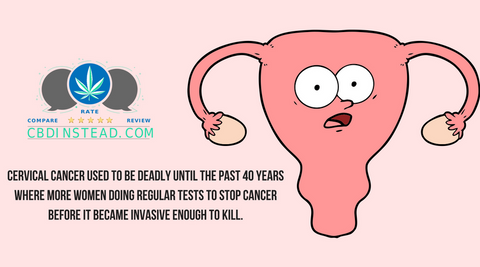
What Is A Cervix
Your cervix is a cylinder-shaped area of tissue that connects the uterus and the vagina. The area that can be seen through the vagina during pelvic exams is called the ectocervix, and the tube that goes through the cervix is called the endocervix. There is an overlapping border between the ectocervix and the endocervix called the transformation zone.
What Is Cervical Cancer
Cervical cancer is when the cells in the cervix become damaged and start to multiply at a dangerous rate. Most cervical cancer begins development in the cells lining the cervix in the transformation zone. The cells that are damaged don’t turn into cancer cells. Instead, the normal cells begin to change and turn into cancer gradually. Luckily, these changes can be detected with a Pap smear test, making this type of cancer easy to diagnose before it gets too severe.
What Causes Cervical Cancer?
The most frequent cause of cervical cancer is getting an HPV infection. There are over 150 different types of HPV infections, and some are a higher risk for cancer than others. HPV infections can usually be taken care of by the body, but when they get out of control, they become chronic infections which can lead to certain types of cancers like cervical cancer.
More Risk Factors Of Cervical Cancer
- Smoking
- Obesity
- Weakened Immune System
- Chlamydia Infection
- Long-Term Use Of Oral Birth Control
- IUD Use
- Diet Low In Fruits And Vegetables
- Multiple Full Term Pregnancies
- The Hormonal Drug DES
- Family History Of Cervical Cancer
Signs OF Cervical Cancer
- Bleeding Between Periods
- Bleeding After Sex
- Pain In The Pelvic Region
- Bleeding Post-Menopause
- Smelly Vaginal Discharge
- Vaginal Discharge With Blood
How Is Cervical Cancer Treated?
Surgery
Surgery can be used to help diagnose cancer, see how far it has progressed, and even treat it. Nine different types of operations range from invasive and radical to unintrusive and simple.
Cryosurgery
This is when they use a cold metal probe to freeze and kill abnormal cells.
Laser Surgery
This is when they send a laser through the vagina to vaporize abnormal cells.
Conization
This is when they use a surgical laser or knife or a thin wire heated by electricity to remove a cone-shaped piece of tissue from the cervix. If the outer layers of the tissue have any signs of cancer, the doctor will determine that more treatment is needed.
Simple Total Hysterectomy
This is when the uterus is removed, but the area around the uterus, vagina, and pelvic lymph nodes stay put. Usually, the fallopian tubes and ovaries are left in place as well unless the doctor decides they need to be included in the surgery.
Radical Hysterectomy
This is when the uterus, the tissue surrounding the uterus, and the top of the vagina connecting to the cervix are removed. Sometimes, the pelvic lymph nodes are removed as well. And good news ladies, even an invasive procedure like this one will not take away any pleasure from having sex.
Trachelectomy
This is when the cervix and part of the vagina are removed. The surgeon will create an artificial opening at the uterus so the woman can still have children.
Pelvic Exenteration
This procedure is used to help eradicate reoccurring cervical cancer. The uterus, the tissue around the uterus, the top of the vagina connecting to the cervix and pelvic lymph nodes are all removed. Also part of the colon, the bladder, rectum, and vagina may also be removed, all depending on how much the cervical cancer has spread.
Pelvic Lymph Node Dissection
Cervical cancer can spread to the lymph nodes in the pelvis, which is why surgeons will remove the lymph nodes to check to see if cancer has taken over. This is done at the same time as the trachelectomy and hysterectomy.
Para-aortic Lymph Node Sampling
If the surgeon finds cancer in the lymph nodes in the pelvis, they may remove the lymph nodes around the aorta as well. They will test to see how far cancer has spread, and radiation may be advised if cervical cancer has become aggressive.
Radiation Therapy
Radiation therapy is when they use high energy x-rays or radioactive particles to kill off cancer cells. This can be used as the solitary treatment or is coupled with surgery or chemotherapy. The side-effects of this type of therapy are fatigue, upset stomach, diarrhea, vomiting, and skin changes.
Chemotherapy
Chemotherapy is when they give you an anti-cancer drug orally or in your veins, and it reaches everywhere in your body. In some cases, chemotherapy and radiation are used to combat cervical cancer.
The unfortunate side-effect of chemotherapy is that it also attacks blood-producing cells in your bone marrow, which can lead to a higher chance of infection, bleeding or bruising after minor cuts, and shortness of breath. Now that we are in a time where medical cannabis is also becoming a valid option to use against cancer, using CBD oil in addition to these treatment options or instead of may be beneficial.

What Is CBD
Cannabidiol (CBD) is a chemical that is found in the marijuana or hemp plant. At CBD Instead, our CBD products are derived from hemp in order to ensure that everyone in all 50 states can benefit from medical cannabis without breaking the law.
The way CBD hemp oil works is by helping to regulate the endocannabinoid system. While it doesn’t interact with this system directly, it does elevate chemicals, stimulate receptors, and opens pathways in the brain to help promote healthy activity in the brain.
Endocannabinoid System
Your endocannabinoid system is in charge of maintaining homeostasis. This system makes sure that everything in your body is running the way that it should. If your endocannabinoid system is compromised, it can cause you to have a myriad of disorders and diseases. The way it works is by having endocannabinoids bind to cannabinoid receptors to help regulate the functions of your body and brain.
Cannabinoid Receptors And Endocannabinoids
There are two cannabinoid receptors that are well known, and scientists believe they may have discovered a third. The first cannabinoid receptor, known as the CB1 receptor, helps mediate neurological functions. The endocannabinoid anandamide is what mainly binds to this receptor, helping to control your mood, sleep cycle, sensitivity to pain, and appetite.
The second cannabinoid receptor is the CB2 receptor. It mainly binds with the endocannabinoid 2-AG which helps with your immune functions. 2-AG helps control how many attack cells are sent to an affected area, helping with pain and inflammation.
How Can CBD Help With Cervical Cancer?
One thing that is pretty incredible about cannabis is that it attacks cancer cells without attacking your body, unlike chemotherapy. CBD has explicitly shown to impair the invasion of cervical cancer, effectively slowing down the process.
In rodent model studies, they have seen that cannabidiol may be able to help stop the invasion of cancer cells in the cervix. This leads scientists to believe that CBD may be able to help eradicate cervical cancer altogether, but more studies are needed.
When testing in test tubes and Petri dishes, they found that cannabidiol and cannabis sativa L both stopped the cancer cells from dividing and spreading as well as killing off the cancer cells. They also noted that cannabidiol was more effective than the cannabis sativa L plant which contains THC.
Other Ways To Help Prevent Cervical Cancer
Cervical cancer doesn’t just show up one day; it takes time to develop. This is why it is so important to go to the gynecologist and have regular pelvic exams. The most invasive forms of cervical cancer were found in women who don’t get regularly tested.
There are also precautions you can take to reduce the likelihood of developing cervical cancer. Getting vaccinated for HPV, reducing your amount of sexual partners, and using condoms can help prevent having an STI that causes cervical cancer. If you smoke cigarettes, quitting that habit can also reduce your chances as well. (You can find out how CBD can help you quit smoking here!)

Talk To Your Doctor
If you want to use CBD along with other treatments, or instead of, then talk to your doctor about it. Go in prepared with the studies so they take you seriously and have an open and honest conversation about what you want to do to help treat cervical cancer. If you are taking any other medications, your doctor can help you determine whether or not CBD will make your body metabolize them differently. Your doctor also has the tools to monitor you closely to help make sure that this is the best treatment plan for you. When you are ready, stop on by our shop and check out the wide variety of options we have to get started!



















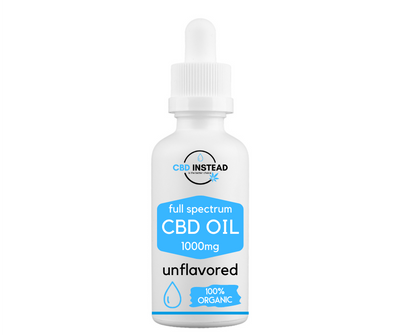
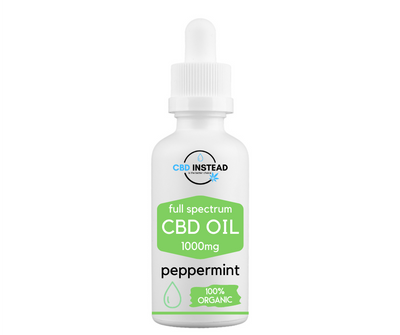
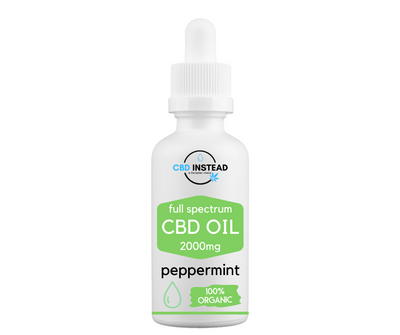
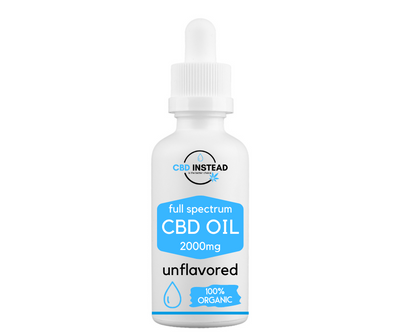
Actually Karl, if you read the source article it states:
“Results obtained … revealed that apoptosis was induced by cannabidiol”
Apoptosis = the death of cells
and
“In conclusion, cannabidiol rather than Cannabis sativa … induce cell death in cervical cancer cell lines.”
Thank you for participating, though. :)
“In the study, they found that CBD oil helped prevent cell death and inhibit cancer cell growth at a significant rate…….”
CORRECTION
You mean promote cancer cell death.